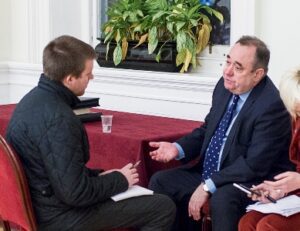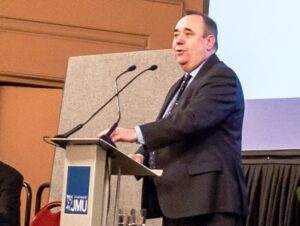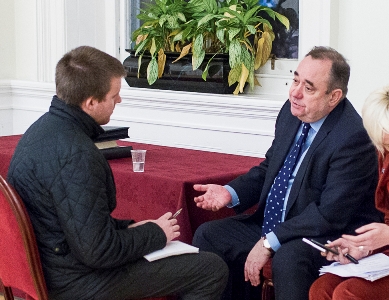
The First Minister of Scotland, Alex Salmond, made the case for his nation’s independence to an audience in Liverpool, before talking exclusively to JMU Journalism.
Mr Salmond was speaking at LJMU’s Roscoe Lecture in a packed St George’s Hall on Monday night about the topic that has been the focus of much attention in the last month. He said that the current devolution settlement was both unsustainable and unfair, not only for Scotland but the whole of the UK and that independence would benefit cities like Liverpool.
Throughout the lecture, the First Minister sought to highlight the similarities between the desire for autonomy north of the border and in Liverpool, and he later told JMU Journalism that both places, as well as other similar parts of the country, had to work together to decentralise financial power in the UK.
Explaining his proposed reduction in corporation tax to JMU Journalism, Mr Salmond said: “The reduction is not going to be huge, it just needs to be a competitive reduction because you have to find a way of getting headquarters out of London.
“Unless places like Scotland, Wales, Northern Ireland, the Irish Republic, or Liverpool for that matter, can find an edge, you’ll end up with every single corporation headquartered in London.
“Far from resulting in a loss of revenue, it will result in increased revenue.”
During the lecture, the former St Andrew’s student told the audience he believed Scottish independence would result in better relations between England and Scotland, citing perceived grudges over the financial relationship between the two as an example of one such strain on the status quo.
He told JMU Journalism: “It’s a bit like free prescriptions. When we do it now they all say, ‘oh, that’s because you’ve been given too much money’.
“When we do it after independence, we can say, ‘well, that’s because we’re doing things better and spending our money on things that are useful, like free education, as opposed to things that are ridiculous, like nuclear weapons.”

The links with our city continued to be talked up, and Mr Salmond evoked Liverpool-born former Prime Minister William Gladstone when he told the audience: “I will back the UK masses against the Westminster classes.”
The First Minister also addressed the recently revealed cabinet papers, which showed the Thatcher Government had been advised by former Chancellor Geoffrey Howe to forget about any economic recovery for Merseyside and asked: “Why should anyone in Liverpool believe that [Chancellor] George Osborne, MP for Tatton, now cares more than Geoffrey Howe, MP for East Surrey?”
Despite the weight of the issues being discussed, there was still room for some humour in the First Minister’s lecture, such as when he reassured Scousers that things would not change too much after independence: “We will continue to invest in the Grand National and we would still be happy to supply this city with football managers,” he said.
“It’s not all good news though; we’d still do the same for Manchester as well.”
Mr Salmond, who was last in Liverpool for last year’s BBC Question Time, told JMU Journalism that he remained committed to offering free higher education to Scottish students after independence, and slammed the coalition
government for their new tuition fee levels.
“The tuition charges, certainly for English students in Scotland are a lot fairer than the ones that have been set for English students in England,” said the Scottish National Party leader.
“OK, there has been a five per cent decline in English students applying to Scottish universities but that’s half the decline of English students applying to go to English universities.
“I’d love to be in a situation where there was no tuition fees for English students in Scotland but I can’t run that position when the Westminster government [sets fees so high]. It would be untenable to sustain that position because every student in England would be applying to Scottish universities.
“We love having English students, we absolutely adore it but we can’t have all the English students in Scotland!” he said.

